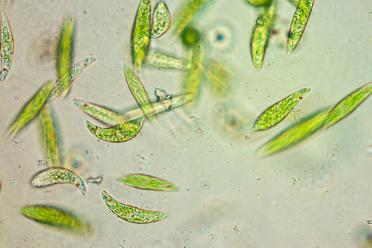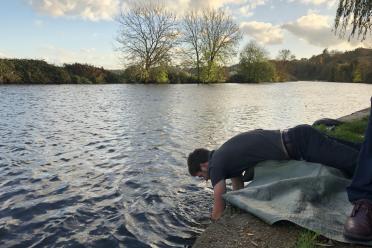COVID-19 testing to liberating bioinformatics: our top ten of 2020
We all know what 2020 will be remembered for, but while battling COVID-19 we’ve continued to deliver world-leading research at the Earlham Institute.
It’s been a busy year at EI. We’ve launched a COVID-19 testing initiative and been involved in global projects to help address the coronavirus pandemic. All the while, our scientists have been hard at work tackling issues such as food security, biodiversity and health, while opening access to crucial bioinformatics resources for the life science community.
To reflect on what has been a difficult and busy yet successful and pioneering year, here is our top ten of 2020.
Scientists of the Korcsmaros Group have been applying their expertise in systems and network biology to the problem of COVID-19 as part of the international COVID-19 Disease Map effort.
They’ve generated new bioinformatics tools for the science community to understand how the SARS-CoV-2 virus infects cells, as well as how that infection then spreads throughout the whole body, by looking at it from the whole systems level. Importantly, those tools - including ViralLink - join up existing data which previously was not connected - increasing the chances of new discoveries leading to medical interventions more quickly.

Georgia Whitton was initially turned down for a placement at EI, but she didn’t let that get in the way of pursuing her dream of becoming a bioinformatician. She redoubled her efforts to learn more and came back to EI, enjoying an award-winning year in which she contributed to research in the Haerty Group, before graduating and landing a job as a data analyst at the Sanger Institute.
Read about why she thinks students need to up their bioinformatics game, and what universities should be teaching.

Our PhD students are a talented bunch. Matt Madgwick and Josh Colmer - two specialists in machine learning with reams of publications already coming out of their PhDs - have produced two articles to help guide researchers who are beginning to apply machine learning to their bioinformatics work for the first time.
Their first guide touched on a and b, with the second covering x and y.

This year, Earlham Institute scientists and operations staff came together to lead a Norwich Research Park-wide effort to provide mass testing of staff and students. The Norwich Testing Initiative was a first-of-its-kind community surveillance scheme for an asymptomatic population, the results of which were published recently in the Journal of Public Health.
Since then, Earlham Institute’s Genomics Pipelines team has gone on to provide testing for thousands of UEA students, helping to stem the second wave of COVID-19 before winter, and are now applying their expertise to help usher in rapid tests along with the Norfolk and Norwich University Hospitals NHS Foundation Trust.

Dr Sally Warring arrived at EI this year from New York amidst the coronavirus pandemic, but that hasn’t stopped her pioneering research into documenting nature’s dark matter: the protists.
Through her compelling public engagement work, she’s bringing the stories of pondlife to the masses, while leading the groundbreaking single-cell genomics research that will help us unlock the secrets of Earth’s most diverse yet underexplored organisms.


Protists do so many different things, some of them have really complex behaviours. They hunt, they mate, they build structures, they can live in complex communities and colonies. They provide lots in every ecosystem.

Josh Colmer, joint author of our Machine Learning guide, also published a first author paper in New Phytologist this year announcing SeedGerm - an automated and high- throughput platform that uses machine learning to analyse images of plants and produce reliable scores on their stage of germination.
This 21st century solution to an ancient problem will provide much-needed improvements for seed companies, who hope to replace lengthy and error-prone manual assessments with automated techniques.

Dr Sally Warring arrived at EI this year from New York amidst the coronavirus pandemic, but that hasn’t stopped her pioneering research into documenting nature’s dark matter: the protists.
Through her compelling public engagement work, she’s bringing the stories of pondlife to the masses, while leading the groundbreaking single-cell genomics research that will help us unlock the secrets of Earth’s most diverse yet underexplored organisms.

The Earlham Institute is at the cutting edge of genomics and computational biology. As such, our e-Infrastructure team hosts several platforms which enable better and more open bioinformatics. CyVerse UK connects users to bioinformatics software and - importantly - the computational power needed to run it.
The resource is essential for those scientists looking to spend more time working from home without losing access to the critical infrastructure they would normally only be able to find at work.

Gene editing of crops offers a sustainable solution to our reliance on an increasingly industrialised agricultural system. Through making small tweaks to plant or microbe genes, we can make environmentally-friendly, probiotic alternatives to pesticides and fertilisers. This will allow us to increase yields from a smaller area of land and give biodiversity more room to thrive.

Aphids are an agricultural nuisance. If they’re not besieging our gardens, they’re spreading a range of diseases to crops and sapping them of vital nutrients in the process. Help is at hand from EI scientists, who have applied genomics and bioinformatics to discover some of the tricks aphids use to colonise plants.
It’s hoped we could use some of the aphids’ tricks against them in the future, by making our crops a less tasty prospect.

Metadata matters, especially when you’re part of a global project that wants to sequence and analyse the DNA of every animal, plant, fungus and protist on Earth. That’s where COPO comes in - a big data broker for life science.
COPO allows users to easily upload all of the metadata - data about data - associated with a sample. In that way, the data comes along with the important context - the how, why, when, where and who - that lets us better understand it.

The plight of our pollinators poses a stark threat to food security. Without them, our supermarket shelves would look bare, missing most fruits and vegetables. That’s why Earlham Institute scientists are applying the latest genomics techniques to give our precious pollinators a boost - from bees to beetles, birds and bats.
Read more about some of the pollinators you perhaps never knew were important for your five-a-day, not to mention your Friday night tequila!

Without healthy soils, we’d have precious little to eat. Since growing up in Colombia, where she saw the effects of mining on local soil diversity, Dr Nasmille Larke-Mejía has been passionate about protecting and enhancing soils for the good of human health and biodiversity.
From protecting against crop pathogens to improving agricultural productivity, she explains why soil health is important in this fascinating interview.
